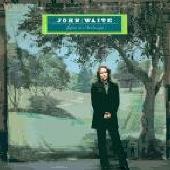



![]()
JOHN WAITE
![]()
"Figure
in a Landscape" (Gold Circle Records; 2001)![]()

![]()
![]()
Reviewed by Shelly Harris




There's no overstating it: "Figure In A Landscape,"
the third solo album released by John Waite since the demise of 'supergroup' Bad English in the
early '90s, is a diverse, highly melodic, and breathtakingly eloquent work of modern art that finds the veteran singer/songwriter at the top of his
game.
Not only is it aurally compelling (as has been typical of Waite's work throughout his long and varied
career), but many of its best cuts also serve as the kind of rare, cathartic salve that can uplift,
soothe - and at times deeply move - the modern, thinking man's soul with a compact and deftly
executed lyrical flair.
Although Waite recently admitted that his endurance over the past 25 years is actually much more a
product of the inextinguishable compulsion of his artist spirit than a materialistic ambition ("I have
absolutely no choice in it"), the unmistakable authenticity of that kind of creative motivation
nevertheless shows in capital letters on this record, just as it did on the two masterful (but ill-fated)
late '90s solo albums that preceded it. (The poignant, dark, and starkly self-revelatory
"Temple Bar" became a shameful casualty of label bankruptcy shortly after its
release; and its follow-up, the storytelling, Americana-flavored "When You Were Mine," virtually "dropped
dead" after getting lost in one of those horrific mega-corporation record label priority shuffles.)
But, even more than that, this record (released on the more intimate, new indie label Gold Circle)
comes closer than any of Waite's past work to being a comprehensive representation of the
remarkable, natural versatility that he has continued to exercise throughout his many stylistic cat's
lives. (He first auspiciously hit the American shores during the mid-70s with progressive/blues/glam
arena rockers The Babys, made more waves during his solo pop/rock mid-80s heyday with
international 'smashes' like "Missing You" and "Change," and moved on for a two album stint with
harder-edged, Neal Schon-guitar powered Bad English.)
Indeed, when you consider such hip, cutting-edge tunes as "Thinking About You" (the new album's
jewel in the crown), it becomes evident that - whatever the personal or pecuniary
toll - there has most definitely been an upside to Waite's chronic artistic non-complacence and restlessness since
those qualities have been integral in saving him from ever being stuck in any of the dated musical
ruts that have been known to stunt the creative relevancy of many of his path finding rock'n'roll
peers.
In fact, apart from the evident benefits that maturity has bestowed on
his songwriting incisiveness and on his distinctive, dynamic vocals and emotive phrasing (always his calling
card) - this album, Waite's latest "Masterpiece of Loneliness" in more ways than one, also begs pause for
reflection on other levels beyond its thought provoking, cut-to-the-bone poeticism and snapshot images of the
alienation and desolation- and the flip-side joys and hopes - of modern urban life.
For a start, it's certainly a strain on the brain when you ponder just WHY it is that Waite, who has
produced so many landmark hits over the years that much of his work has become part of our
collective pop culture psyche, has still somehow remained surprisingly underestimated and
overlooked in the current "rock royalty" schemata even when he continues to retain his edge in
delivering stunning, contemporary records like this one.
But Waite himself makes a point well taken when he philosophizes that
"sometimes it's almost better to go the long way around" when referencing not only turning his back on Bad English in the
early '90s, but also his resolve to carry on with his artistic evolvement even if it meant a kind of
shunning by the fickle powers that be in the American mainstream. For Waite, that
meant not only more laser-like lyrical introspection, but also drawing more from his bluesy, folksy,
Appalachian-flavored "roots" with the two 90s era solo offerings (come what may of his
"commercial" validity).
But then artistic integrity (a thing he's never been short on) often requires such courage over the
long haul. And all those risks haven't gone for naught with "Figure In A Landscape," which finds
Waite continuing to look forward, but also at a phase where he has enough perspective to graft in
the best elements of the two preceding solo albums as well as many of the diversified strengths
from his more distant creative past.
Indeed, in a different world (a world where record companies weren't forced to pay middlemen astronomical sums to get new songs "added" on the corporate/conglomerate/radio programming Gods' playlists) John Waite would be guaranteed at least four substantial radio "hits" off an album with this much depth. Still, hands down, the absolute knockout is the lyrically riveting "Thinking About You," an ultra-Now mid-tempo rocker (in the vein of Third Eye Blind/Fuel) that not only showcases Waite's vocal purity and delicately nuanced passion, but also lands a hit directly on the solar plexus with its slice-of-life poetic sensibilities and command of poignant irony.
Running a close second, though, would have to be the shimmering, finely
crafted beauty, "NYC Girl," which displays the sophisticated, bohemian-in-Manhattan
consciousness - the subtly sculpted metaphors and atmospheric moodiness - of the late era solo albums. Ditto for "Always Be
Your Man," which, along with tunes like "Touch," indicates that Waite -
consummate "confessional" songwriter that he became with the "Temple Bar"
album - is showing signs of coming to terms with certain profound life disillusionments and unresolved relationship/romantic regrets. (Closure,
acceptance, and redemption might be the operative words here - and who amongst us couldn't
vicariously use such an eloquent mouthpiece for some of those things?)
Next up is "Fly," the soaring, conciliatory, and melodically haunting number released as the first
single off the album. Curiously, though it is one of the stronger, mainstream-ready cuts, it is actually
one of only two songs on the disk (along with an achingly tender version of "Whenever You
Come Around," Vince Gill's paean to knee-weakening infatuation) that Waite didn't write. (Still, apart from
the fact that it is always cool when an elite-level and prolific songwriter like Waite appreciates other
artists' work enough to record it, it can also be inferred that - like the rest of we
mere mortals who don't write our own songs--he internalized "Fly" as his own after listening to it in his car for 18
months straight.)
Then there's also the retro pop/R&B laced album opener, "Keys to Your Heart," which was originally
tagged as the first single, presumptively because it's the most lighthearted, "party" sounding (and
thus more broadly accessible?) tune in the collection. However, "Special One" approaches it in
its overall upbeat vibe and, like the more esoteric and moody "New Thing," lyrically shows a
new - if tentative - sense of optimism on the romantic front. (Of course, whether you prefer the
surprised-in-new-love cuts or the plaintive, yearning, soul-searching side of Waite's collection on
this disk may depend on your own current attitude or state of affairs.)
In any case, in an album full of apples, oranges, and pears - as well as kiwis, mangoes, and
pomegranates - the bona fide passion fruit of the lot would have to be "Godhead." That full-on
blistering blues rocker not only displays Waite's ability to hold his own wailing the nitty-gritty with
some of the best blues-influenced rock frontmen in the book, but it is also a mind-blowing,
triple-entendre'd lyrical abstraction as well. Specifically - and depending on the mindset of the
listener - "Godhead" could have a couple of, well ... erotic meanings, the most obvious being the first
thing likely to pop into a teen-aged guy's mind based on the title alone (best not to elaborate),
or the deeper one that is apt to titillate the imagination of that same teenager's dad:
actual nirvana-like, rock-your-world, transcendental sex). And then there's the elevated,
intellectual references to Zen Buddhism ("we got nothing, we got everything"), an introspective, humanistic
spiritual philosophy that has quietly influenced many of Waite's lyrical themes in more recent years.
But, any way you want to interpret it, the song will absolutely burst your
thermometer - a la Hendrix - on its psychedelic-guitar powered energy and raw sensuality alone. (FYI, with the exception of a
couple of the moodier, slower, atmospheric tunes, this record has many various guitar
stylizations right at the very forefront.)
Although, depending on the breadth of the musical taste of the listener, it might be criticized for
being almost too stylistically diverse, this whole album still has the unmistakable stamp of John
Waite in all his authentic versatility. Then, too, because of the rich and varied "real time"
perceptions its songs evoke, "Figure In A Landscape" is actually a balanced and
accurate representation of the multidimensional rollercoaster ride that real life actually is.
In the end, though it has no one overt or deliberate theme, under the umbrella of the scathing
honesty of its cornerstone song, "Masterpiece of Loneliness" (which generated the albums' title and
is also the one song Waite has ever written that he says he can't bear to listen to because "it's too Me"),
"Figure In A Landscape" actually becomes the thing that it lyrically yearns
for most: "something real, something true." And, whether it spawns radio "hits" or not, you're bound to utterly
embrace this record if you long for such things too.
![]()
Rating Guide:



 A classic. This record will kick your ass.
A classic. This record will kick your ass.


 Killer. Not a classic but it will rock your world.
Killer. Not a classic but it will rock your world.

 So-so. You've heard better.
So-so. You've heard better.
 Pretty bad. Might make a nice coaster.
Pretty bad. Might make a nice coaster.
![]() Self explanatory. Just the sight of the cover makes you wanna hurl.
Self explanatory. Just the sight of the cover makes you wanna hurl.
![]()
Copyright © 2001 by R. Scott Bolton. All rights reserved.
